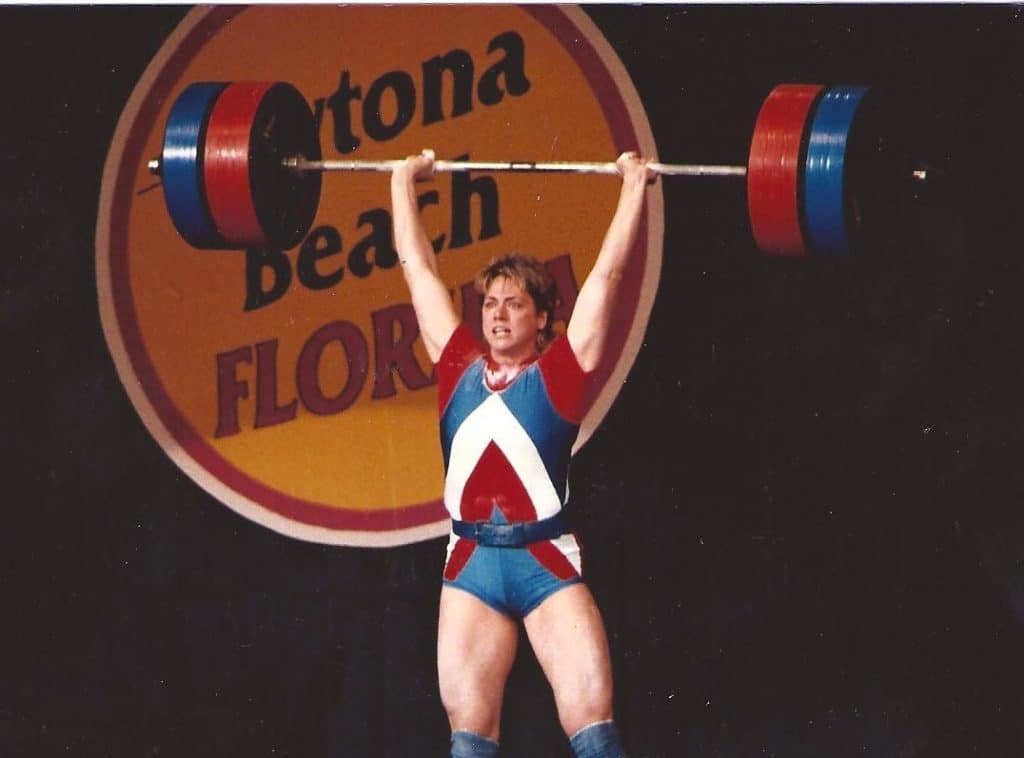By Lindsey Konkel
Karyn Marshall felt immense pride watching American women compete and win a medal in weightlifting at the Olympic Games in Rio de Janeiro. While men’s weightlifting has been an Olympic staple since the start of the modern Games in 1896, women didn’t get a chance to compete until 2000.
Marshall, who took up competitive weightlifting in the 1970s when few women ventured into gymnasium weight rooms, smiled as she reflected on her path and the hurdles she helped tumble.
“It took a fight to get us here,” said Marshall, who spoke about her groundbreaking journey at TEDxNavesink Accelerators in 2015. “I’m proud that I was part of that fight.”
Weightlifting had always been a man’s sport. “Lifting heavy things just wasn’t seen as feminine,” Marshall said.
In the 1970s, women weren’t supposed to aspire to be strong or athletic or to enjoy the challenge of competition, Marshall explained. “But those were all attributes I identified with. I loved being strong and fighting for what I wanted,” she said.
Marshall lifted her first barbell in 1978 in the basement of a White Plains YMCA. “I think I was the first woman ever to go down there and work out,” she chuckled.
Marshall was in college at the time and missed the basketball, field hockey, and tennis competitions she enjoyed in high school. A male friend who weight-lifted told her she might enjoy it. Marshall entered that den of testosterone and never looked back.
She accelerated quickly in the sport. Soon, she was lifting as much or more weight than many of her male peers.
Marshall longed to test herself in competition, yet there were no women’s events. She got her first chance in 1979 in a regional qualifier for New York’s Empire State Games.
It was a men’s only competition, but the organizers let her compete. She lifted enough weight to surpass most of her male opponents and qualify for the Empire State Games, though she ultimately was barred from competing in the statewide competition because of her gender.
Marshall continued to prove herself and pave the way for other women in the sport. She set 45 national weightlifting records.
In 1985, she became the first woman in history to clean and jerk more than 300 pounds. (The clean and jerk is two-movement exercise where the athlete brings the barbell from floor to shoulder level and then from shoulder level to overhead.) Marshall won the first-ever Women’s World Championships in 1987, making her the world’s strongest woman.
Opening doors became as integral to her identity as being strong.
“That process, that fight taught me how to live and shaped who I am today,” Marshall said.
She’s a chiropractor and small business co-owner at Champion Chiropractic in Shrewsbury. She’s also a breast cancer survivor. The fight and focus she gained weightlifting helped her battle through chemotherapy.
Marshall still competes in athletic events. In 2011, she placed sixth in the 55-60-years-old Master’s Division at the Crossfit Games.
Getting women’s weightlifting into the Olympics was the ultimate goal. “We wanted to show that we were worthy of competing on that same stage,” Marshall said.
People sometimes ask if she is bitter or angry that she never got the chance to compete when the women’s weightlifting debuted in the 2000 Summer Olympics in Sydney. Not at all, she says.
“It wasn’t my time to be there,” Marshall said. “My time was to come before, to lay the foundation and to be part of that proving ground.”
Perhaps even more rewarding than seeing elite women’s weightlifters at the Olympics is knowing that women now enjoy lifting weights in gyms all over the world.
“Those little victories added up. Weightlifting is now a popular thing for women to do,” she said.
Marshall, who lives in Monmouth Beach, was inducted into the USA Weightlifting Hall of Fame in 2011 by none other than Arnold Schwarzenegger. Last year, she was inducted into the International Weightlifting Federation Hall of Fame.
Hear other inspiring stories such as Karyn’s at TEDxNavesink Identity in April 2017, where we’ll explore all aspects of identity. Get your tickets now.

